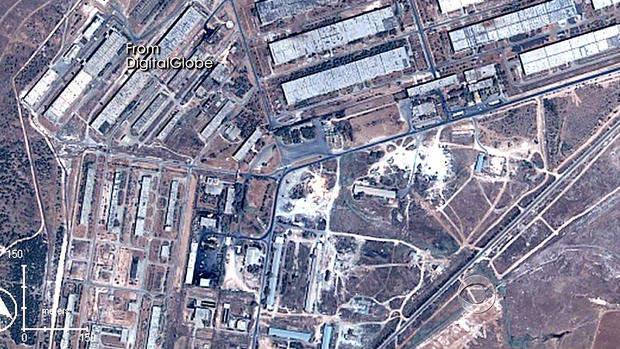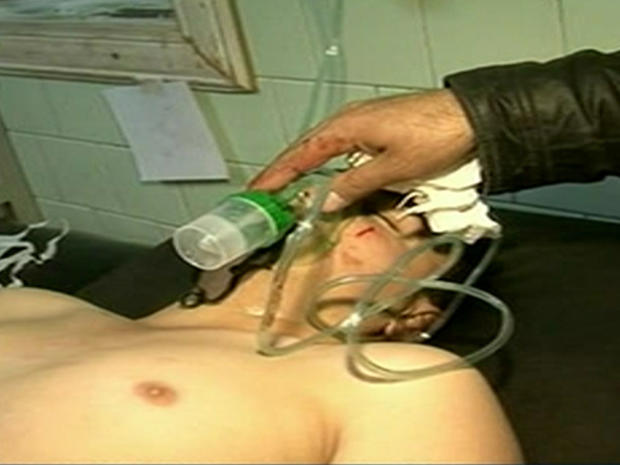Is the "red line" on Syria's chemical weapons blurring?
London President Barack Obama said the U.S. was still investigating claims that chemical weapons were used in Syria to determine if a "red line" had been crossed, reiterating that any such use would represent a "game-changer" in terms of U.S. action toward the Assad regime.
But Mr. Obama was clear that the facts of Tuesday's alleged chemical attack - for which both the rebels and the regime traded blame - had yet to be conclusively established, including whether it took place at all, despite some escalating rhetoric from within the U.S. and Israel.
Rep. Mike Rogers, R-Mich., chairman of the House Intelligence Committee, told "CBS This Morning" on Wednesday that there was a "high probability that a chemical agent was used in Aleppo."
"There has been some forensic evidence that at least small quantities may have been used in the past," said Rogers.
Israeli cabinet minister Yuval Steinitz echoed that sentiment Wednesday morning, calling it "apparently clear" that chemical weapons were recently used in Syria, just as Mr. Obama was due to touch down in Tel Aviv.
But if Rogers had information on forensic evidence, he didn't elaborate on it.
Others have been more cautious with their characterizations of Tuesday's incident. U.S. Ambassador to Syria Robert Ford told a House panel that the U.S. "no evidence to substantiate the reports that chemical weapons were used yesterday," And Rep. Dutch Ruppersberger, D-Md., who is the top-ranking Democrat on the House Intelligence Committee and has been briefed on the matter, wouldn't go as far as Rogers' "high probability" comment, saying only that he was "very concerned" about the reports.
- Obama begins Israel trip in shadow of Syrian chemical weapons claims
- Sen. Graham calls for boots on the ground in Syria
- NATO planning for possible Syria missions, official says
The devil is in the details
CBSNews.com has spoken to two leading experts in chemical and biological weapons and warfare, and the clear consensus is that no chemical weapons have been used inside Syria.
"I am extremely skeptical that this (Aleppo strike) was a chemical warfare incident," said Jean Pascal Zanders, an expert in chemical and biological warfare with the European Union Institute for Security Studies.
Zanders said that images of victims in local hospitals and their descriptions of what they experienced left him with little doubt.
"The descriptions (of symptoms) would be totally, totally different to what we've been reading" if one of Syria's known chemical agents had been dispersed.
Syria is known to have significant stockpiles of Sarin gas, mustard gas and a variety of other military-grade agents, which attack the human respiratory and nervous systems.
There were many claims that a chlorine odor was present after the explosion in Khan al-Assal, and that victims suffered acute respiratory problems. There were even claims that some died of asphyxiation, but there was no evidence of dead bodies. In all, Zanders said evidence of a chemical weapons attack was very weak.
Rogers, however, was careful not to use the term "chemical weapons" on Wednesday. He said "chemical agents."
While Rogers would not elaborate on what he believes the Assad regime may have used against the rebels, Syria expert Salman Shaikh, director of the Brookings Institution's Doha Center, suggested to CBSNews.com on Wednesday that the government has been "experimenting with various compounds and mixtures to see how they could use these (chemical agents) in a localized fashion."
Shaikh said his sources, who travel to and from Damascus and maintain contact with both current and former regime officials, are certain that Assad's regime has tried out less lethal, less widely dispersed compounds for months.
His contacts, "believe they (the regime) could produce mixtures that would produce harm, but not on a massive level ... and could be deployed within, say, a one-square-mile area," to target rebel holdouts in a particular area.
While Shaikh suggested that the less-lethal compounds could include weapons derived from Syria's known stockpiles of sarin gas and other agents, a far less sinister substance may be at the root of the current chemical weapons rhetoric: pesticide.
Hamish de Bretton-Gordon, an expert in chemical and biological weapons and the head of U.K. consultancy SecureBio, told CBSNews.com on Wednesday that the culprit could well be organic phosphates, which he described as "the basis in all chemical weapons."
Organic phosphates, explains Bretton-Gordon, "are a key part of pesticide, but it is the basis for nerve agents," and there is "a lot in the country."
He said using organic phosphates as a weapon is, "not complicated: You get a bag of pesticide and you blow it up, and there is going to be fallout from the organic phosphate."
Even one bag of pesticide could be sufficient to cause symptoms, which he described as similar too, but "not nearly so widespread as a chemical weapon," according to Bretton-Gordon. Those symptoms generally begin with pinpoint pupils, disorientation, dizziness and salivation; with a higher dose, those symptoms include collapse, difficulty breathing, convulsions, loss of control of bodily functions, and eventually, death.
Bretton-Gordon notes, however, that to cause mass fatalities, "you would need a pretty good whack of organic phosphates."
A Washington D.C.-based Syrian opposition group claimed Wednesday that rebels in Aleppo had confirmed the missile which struck Khan al-Assal on Tuesday was tipped with Echothiophate, which it called "a chemical warfare agent" found in insecticides.
So where is the red line?
Rogers asserted on CTM Wednesday that the U.S. has the military "ability to remove" Syrian President Bashar Assad's capabilities to actually use his chemical weapons without putting soldiers on the ground.
"I doubt it very much," responded Zanders. "Sure, they can hit the storage sites, but if you hit the storage sites you get the uncontrolled release of agent. There is no way you can hit the storage sites without producing a cloud that is going to kill indiscriminately in the area. It would absolutely backfire if the Americans were to do this."
"One really has to be careful that ratcheting up the rhetoric does not serve the purpose of a military intervention," Zanders said. "We've seen it on the eve of the invasion of Iraq. These types of allegations were being made."
Rogers seemed to suggest Wednesday that it may be a short leap from "agent" to "weapon."
"If we're ever going to have a diplomatic solution, where this regime doesn't get to the point where it uses mass quantities of chemical weapons, we've got to rebuild our credibility," Rogers told CTM's Charlie Rose. "One way to do that is to remove their capability to use chemical weapons on civilians."
The question then becomes, does the use of organic phosphate or other chemical "agents" constitute a crossing of the Obama administration's red line? Would proof that the regime is using such compounds against rebels -- even in populated areas -- bring a preemptive strike that could draw the U.S. into a war in the Middle East?
President Obama landed Wednesday in Israel for a four day "listening" tour in the region. He will likely be grappling, as he listens, with just how clear the red line he painted months ago remains today.

